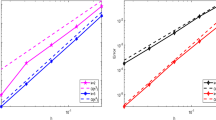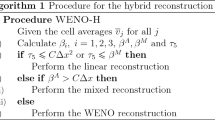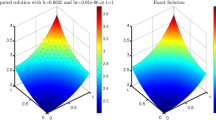Abstract
The finite volume methods are one of the most popular numerical procedure to approximate the weak solutions of hyperbolic systems of conservation laws. They are developed in the framework of first-order numerical schemes. Several approaches are proposed to increase the order of accuracy. The van Leer methods are interesting ways. One of them, namely the MUSCL–Hancock scheme, is full time and space second-order accuracy. In the present work, we exhibit relevant conditions to ensure the L1-stability of the method. A CFL like condition is established, and a suitable limitation procedure for the gradient reconstruction is developed in order to satisfy the stability criterion. In addition, we show that the conservative variables are not useful within the gradient reconstruction and the procedure is extended in the framework of the primitive variables. Numerical experiments are performed to show the interest and the robustness of the method.
Similar content being viewed by others
References
Baudin M., Berthon C., Coquel F., Masson R., Tran H. (2005) A relaxation method for two-phase flow models with hydrodynamic closure law. Numer Math 99(3): 411–440
Berthon C. (2005) Stability of the MUSCL schemes for the Euler equations. Commun Math Sci 3, 133–158
Berthon, C. Numerical approximations of the 10-moment Gaussian closure. Math Comp (accepted)
Bianco F., Puppo G., Russo G. (1999) High-order central schemes for hyperbolic systems of conservation laws. SIAM J Sci Comput 21(1): 294–322
Bouchut F. (2004) Nonlinear stability of finite volume methods for hyperbolic conservation laws, and well-balanced schemes for sources. Frontiers in Mathematics series, Birkhäuser
Colella P. (1990) Multidimensional upwind methods for hyperbolic conservation laws. J. Comput. Phys. 87, 171–200
Coquel F., Perthame B. (1998) Relaxation of energy and approximate Riemann solvers for general pressure laws in fluid dynamics. SIAM J Numer Anal 35(6): 2223–2249
Cordier, S., Buet, C. Asymptotic preserving scheme for radiative hydrodynamics model. (in press)
Durlofsky L.J., Engquist B., Osher S. (1992) Triangle based adaptive stencils for the solution of hyperbolic conservation laws. J Comput Phys 98, 64–73
Godlewski, E., Raviart, P.A. Hyperbolic systems of conservations laws. SMAI (eds), Ellipse 1991
Godlewski E., Raviart P.A. (1995) Hyperbolic systems of conservations laws. Applied Mathematical Sciences, vol. 118. Springer, Berlin Heidelberg New York
Harten A., Lax P.D., Van Leer B. (1983) On upstream differencing and Godunov-type schemes for hyperbolic conservation laws. SIAM Rev 25(1): 35–61
Jin S., Xin Z. (1995) The relaxation scheme for systems of conservation laws in arbitrary space dimension. Commun Pure Appl Math 45, 235–276
Karni S. (1994) A multicomponent flow calculations by a consistent primitive algorithm. J Comp Phys 112, 31–43
Khobalatte B., Perthame B. (1994) Maximum principle on the entropy and second-order kinetic schemes. Math of Comput 62(205): 119–131
van Leer B. (1979) Towards the ultimate conservative difference scheme. V. A second-order sequel to Godunov’s method. J Comput Phys 32, 101–136
van Leer B. (1984) On the relation between the upwind-differencing schemes of Godunov, Engquist-Osher and Roe. SIAM J Sci Statist Comput. 5(1): 1–20
LeVeque, R.J, Finite volume methods for hyperbolic problems. Cambridge Texts in Applied Mathematics. Cambridge Cambridge University Press, (2002)
LiSkA R., Wendroff B. (2003) Comparison of several difference schemes on 1D and 2D test problems for the Euler equations. SIAM J Sci. Comput 25(3): 995–1017
Nessyahu H., Tadmor E. (1990) Nonoscillatory central differencing for hyperbolic conservation laws. J Comput Phys 87(2): 408–463
Noh W.F. (1987) Errors for calculations of strong shocks using an artificial viscosity and an artificial heat flux. J Comput Phys 72, 78–120
Perthame B., Qiu Y. (1994) A variant of Van Leer’s method for multidimensional systems of conservation laws. J Comput Phys 112(2): 370–381
Sanders R., Weiser A. (1992) High resolution staggered mesh approach for nonlinear hyperbolic systems of conservation laws. J Comput Phys 101, 314–329
Toro E.F. (1999). Riemann solvers and numerical methods for fluid dynamics. A practical introduction, 2nd edn. Springer, Berlin Heidelberg New York
Author information
Authors and Affiliations
Corresponding author
Rights and permissions
About this article
Cite this article
Berthon, C. Why the MUSCL–Hancock Scheme is L1-stable. Numer. Math. 104, 27–46 (2006). https://doi.org/10.1007/s00211-006-0007-4
Received:
Revised:
Published:
Issue Date:
DOI: https://doi.org/10.1007/s00211-006-0007-4




